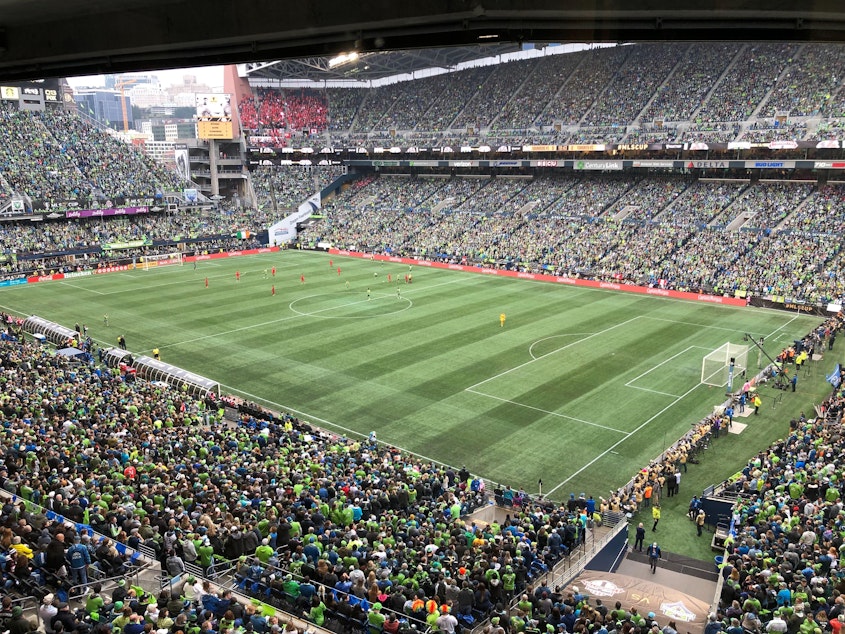What are the true costs of going cashless? Jobs?

Some modern customers can remember the days in line at a grocery store and seeing someone ahead of you take out the dreaded checkbook.
That checkbook meant something. It meant more waiting as the person filled it out, signed it, handed it over for it to be inspected. Perhaps their ID had to be documented for extra security. It was a time-sucking pain.
But some see using cash as the modern equivalent of this consumer pet peeve – good old green money. It turns out, cash is no longer king; it’s an inconvenience.
3 takeaways from Amazon's new cashier-less grocery store
But hold up. Tech isn't always what it's cracked up to be, according to Lana Swartz, assistant professor of media studies at the University of Virginia. There are costs associated with using credit and debit cards. Going entirely cashless could also have impacts on certain jobs.
“There are these moments where technology does break down,” Swartz told KUOW's Bill Radke on The Record. “Technology sometimes introduces as much friction as it eliminates.”
Swartz studies the development of money and tech, and is the author of "New Money: How Payment Became Social Media."
While at one end there may be friction, convenience is on the other end. That's likely why Seattle’s CenturyLink Field went cashless this month. The stadium states that several other event centers have successfully gone cashless. It will now only accept cards at its retail shops and concessions stands. Also, parking and vendors will be strictly plastic.
On top of that, Apple Pay, Google Pay and Samsung Pay are accepted at many locations around the stadium.
Sponsored
The idea of going fully cashless is that people waiting in line for their chicken tinga tacos won’t have to wait even longer for someone else to rifle through their wallet, look for the proper bill, get change, file that back away in their wallet where the bills have to be, in order from smallest to largest.
Instead, swipe that plastic and go.
There will be 10 kiosks for customers to turn their green funds into a plastic card. There is no fee for the cards and they can be loaded with as little as $1. The box office, however, will still accept paper money.
“I do think it’s great that they are choosing to allow to have these kiosks for people who are still in the cash economy, however,” Swartz said. “There are plenty of people who still live primarily in the cash economy. While we tend to think that cash is going away, according to most of the good data that I see, from places like the Federal Reserve, we actually aren’t getting rid of cash as fast as some tech companies would like us to believe.”
CenturyLink Field is not alone. Tropicana Field in Florida is another sports stadium that has gone cashless. Mercedes-Benz Stadium in Georgia is another one.
Sponsored
The cash class
What many people may not realize, is that it can cost money to use plastic. Swartz points out that to use many cards, such as ones with rewards, a person needs a high credit score and a decent bank account.
“In fact, what seems to be happening, is we are not moving so much toward a cashless society, we are moving toward a cash-light society,” Swartz said. “That cashlessness is not going to be spread evenly throughout the populous."
She notes that while an affluent, educated person can more easily get a card, reducing their use of cash, other segments of society have a different experience.
"The person sitting next to us working a minimum wage job … is going to be using a lot more cash," she said. "We can’t imagine that our habits and our financial tendencies are what everybody is doing.”
Sponsored
Everybody is certainly not using debit and credit cards. About 55 million people are estimated to be "unbanked" in the United States, meaning they do not use bank or its cards. In Washington state, about 3% of the population is unbanked, and 22% is underbanked (little access to banking services).
“To interact with establishments that don’t accept cash, and in order to interact with everything online that only accepts credit cards, you typically have to use what the industry calls ‘prepaid cards,’" Swartz said. "These prepaid cards are very costly to use. They come with fees that look like a $20 initiation fee, a $9 monthly fee, a fee every time you add money onto it, a fee every time you take money out of it. According to some estimates, they can cost up to $300 a year just to have these prepaid cards.”
The cost of cashless -- jobs?
The calculation that CenturyLink, and businesses like it, have likely already worked out is the cost of going cashless. After all, it costs money to process credit and debit cards. Every swipe costs someone a transaction fee.
“Let’s just say there are 70,000 people going to a game, and they each spend about $20 — that gets you about $1.4 million in revenue, which means about $25,000 in swipe fees, per game," Swartz estimates. "That’s a decent chunk of money. That’s about what a person earning minimum wage at $15 makes a year.
Sponsored
“The payoff for them is going to be convenience, getting people through the concession line quickly."
That can add up to yet another effect of of going cashless -- threatened jobs.
“Stadiums sometimes make arguments to the taxpayers … that they are creating jobs,” Swartz said. “If you’re paying $25,000 a game in swipe fees, that’s not $25,000 that you’re paying for well-trained employees who can handle cash. By moving to a cashless system, you make your concession staff more disposable, less trained, and potentially paid less.”
"Everything costs money, it's just a question of what you're spending that money on."
KUOW's Dyer Oxley produced this post for the web.


